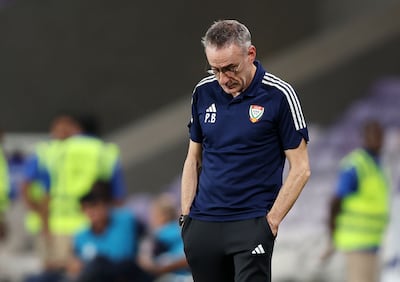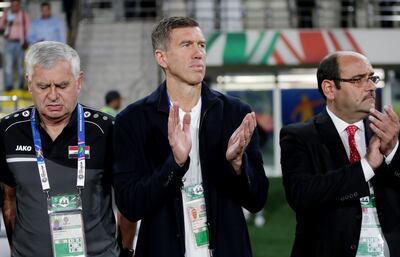It is only a third of the way through the third round of Asian qualifying for the 2026 World Cup, and yet it already feels like a crucial time for the UAE.
The national team will face Uzbekistan in Tashkent on Tuesday evening, in what could be a pivotal encounter in the group.
Why it matters
Paulo Bento, the UAE coach, pointed out ahead of the start of this phase of competition that the race for qualification is a long one.
It is 10 matches, across five international breaks, up until next summer. The top two sides in the six-team group will go straight to the World Cup in Canada, Mexico and the United States.

There is still a chance to make it without finishing in the top two, but the path becomes ever more complex and perilous thereafter.
This time last month, the national team were ahead of where they expected to be thanks to their opening day shock of beating Qatar in Doha. But they have taken just one point from home games against Iran and North Korea in the time since.
The first of those, a 1-0 loss to Iran, was forgivable, given the Iranians are serial World Cup participants and the highest-placed side in the Fifa rankings in the pool. The second, a draw against a North Korea side ranked 42 places below them, was less so.
It leaves the third-placed UAE three points in arrears of both Uzbekistan, who top the group, and Iran. All of which means a win or at least a draw in Tashkent feels vital. Lose to the Uzbeks, and the gap might start to feel unbridgeable.
Familiar face

Well, maybe not quite so familiar. Srecko Katanec is a former UAE coach. He was in charge of the national team for two years, from 2009 to 2011.
When he was appointed, the Burj Khalifa had yet to open, and the end of his reign coincided with the arrival of Diego Maradona in the UAE as manager of Al Wasl. That’s how long ago it was.
So, it stands to reason he might not be quite so recognisable to the current vintage of UAE national team players.
The lanky Slovenian’s memories of his time in Dubai might not be happy ones. When he left the post, they were 112th in the Fifa rankings and by the end of the year they were at their historic low of 138. Now they are up at 69 and looking upwards.
Katanec’s time in Uzbekistan has been markedly better, though. Since he took the position in 2021, they have steadily risen 24 places and are now 60th in the rankings.
Changing times

When Katanec was with the UAE, the league that services the national team had only just gone professional.
His national team itself was just as it had always been in this country. Meaning it was made up exclusively of UAE-born players, plying their trade in the domestic league.
How times have changed since. Now the squad includes a number of players born overseas who have served Fifa’s five-year residency qualification, as well as become UAE citizens.
The latest naturalised players to win first caps are Bruno de Oliveira and Marcus Meloni. The Jazira forward, De Oliveira, endured a frustrating evening when he debuted on the left wing against North Korea on Thursday.
Sharjah’s Meloni had a similarly forgettable debut, coming on for just enough time near the end to get himself a yellow card.
Katanec’s own side includes players with experience elsewhere. Uzbekistan have players who play in the top divisions in Russia, Saudi Arabia, and France, while Eldor Shomurodov has played for a number of clubs in Italy.
Known – perhaps unoriginally – as the Uzbek Messi, Shomurodov cost his current club Roma €17.5 million, and is Uzbekistan’s all-time record goalscorer.
Starters and finishers
Bento was right to point out that the performances by his side have generally been good – as evidenced in the win in Doha and narrow loss to Iran last month – but that the 1-1 draw with North Korea was a dropped stitch.
Generally, since the beginning of round three of Asian qualifying, the Portuguese coach has favoured a watchful start performed by a diligent side of workers, before unleashing some X-factor from the bench.
It worked a charm in Doha, for example, where the UAE turned a 1-0 half-time deficit into a 3-1 win with a late surge.
Ali Saleh, the box-of-tricks winger from Al Wasl, scored as a late substitute in that game, and Yahya Al Ghassani came off the bench to do similar last time out against North Korea.
Perhaps tellingly, those three matches to date have all been played in steamy conditions in late summer in the Middle East.
So it makes sense to unleash tricky players like Saleh and his Al Wasl club colleague Fabio De Lima to face wearying defences.
Exhaustion is unlikely to be quite such a factor in Tashkent. Temperatures in the Uzbek capital are likely to be more forgiving, with it forecast to be in the low teens, with rain possible, too.
As such, Bento might think about altering his plan for starters and finishers.








